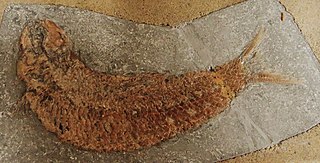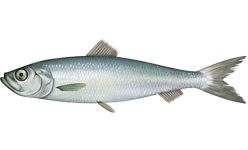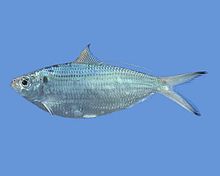
Clupeiformes is the order of ray-finned fish that includes the herring family, Clupeidae, and the anchovy family, Engraulidae. The group includes many of the most important forage and food fish.

Herring are various species of forage fish, mostly belonging to the family of Clupeidae.

Sprat is the common name applied to a group of forage fish belonging to the genus Sprattus in the family Clupeidae. The term also is applied to a number of other small sprat-like forage fish. Like most forage fishes, sprats are highly active, small, oily fish. They travel in large schools with other fish and swim continuously throughout the day.

The Atlantic Spanish mackerel is a migratory species of mackerel that swims to the northern Gulf of Mexico in spring, returns to southern Florida in the eastern Gulf, and to Mexico in the western Gulf in the fall.

The Australian herring, also known as the ruff, tommy ruff, or Australian ruff, is one of four Australasian fish species within the genus Arripis. It closely resembles its sister species, the Australian salmon, although it grows to a smaller size. Like the other members of its genus, it is found in cooler waters around the southern coast of Australia. It is not biologically related to the herring family Clupeidae.

Bathyclupea is a genus of ray-finned fishes belonging to a small family Bathyclupeidae.

The Atlantic thread herring is a herring-like fish in the family Clupeidae.

Pholidophorus is an extinct genus of stem-teleost fish. Numerous species were assigned to this genus in the past, but only the type species Pholidophorus latiusculus, from the Late Triassic of Europe, is considered to be a valid member of the genus today.

Sardinella is a genus of fish in the family Dorosomatidae found in the Atlantic, Indian and Pacific Ocean. They are abundant in warmer waters of the tropical and subtropical oceans. Adults are generally coastal, schooling, marine fish but juveniles are often found in lagoons and estuaries. These species are distinguished by their ranges and by specific body features, but they are often confused with one another. Fish of the genus have seven to 14 striped markings along the scales of the top of the head. The paddle-shaped supramaxilla bones are characteristic; they separate Sardinella from other genera and their shapes help distinguish species. They have paired predorsal scales and enlarged fin rays.

Jenkinsia is a genus of round herring in the family Spratelloididae. They are found in the central western Atlantic Ocean, the Gulf of Mexico, and the Caribbean Sea. Four recognized species are placed in this genus.

An anchovy is a small, common forage fish of the family Engraulidae. Most species are found in marine waters, but several will enter brackish water, and some in South America are restricted to fresh water.

Harengula is a genus of marine ray-finned fishes belonging to the family Dorosomatidae, the gizzard shads and sarinellas/ The fishes in this genus occur mostly in the western Atlantic, Gulf of Mexico and the Caribbean Sea, with one species in the eastern Pacific Ocean. There are currently four described species.

Herklotsichthys is a genus of herrings in the family Dorosomatidae found mostly around Southeast Asia and Australia with one species each in the Persian Gulf, the Red Sea, and the western Indian Ocean. This genus currently contains 12 species.
Odontognathus is a genus of longfin herrings in the family Pristigasteridae. Currently, three species are recognized for this genus, all of which are restricted to tropical waters of the Western Hemisphere.

Herring are forage fish in the wild, mostly belonging to the family Clupeidae. They are an important food for humans. Herring often move in large schools around fishing banks and near the coast. The most abundant and commercially important species belong to the genus Clupea, found particularly in shallow, temperate waters of the North Pacific and North Atlantic Oceans, including the Baltic Sea, as well as off the west coast of South America. Three species of Clupea are recognized; the main taxon, the Atlantic herring, accounts for over half the world's commercial capture of herrings.

Clupea is genus of planktivorous bony fish belonging to the family Clupeidae, commonly known as herrings. They are found in the shallow, temperate waters of the North Pacific and the North Atlantic oceans, including the Baltic Sea. Two main species of Clupea are currently recognized: the Atlantic herring and the Pacific herring, which have each been divided into subspecies. Herrings are forage fish moving in vast schools, coming in spring to the shores of Europe and America, where they form important commercial fisheries.

The Alosidae, or the shads, are a family of clupeiform fishes. The family currently comprises four genera worldwide, and about 32 species.
The Pacific thread herring or deep-bodied Pacific thread herring is a herring-like fish in the family Clupeidae. It is found in the Eastern Pacific. It can grow to 30 cm (12 in) total length.
Thread herring may refer to either of two herring-like fish in the family Clupeidae:
















